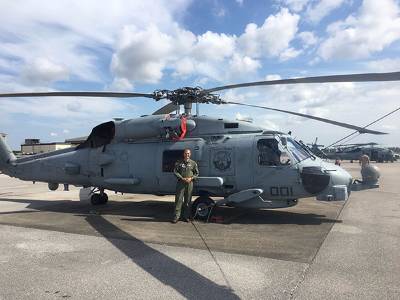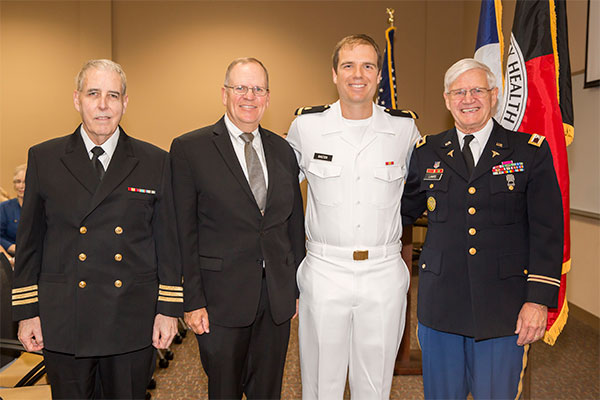Flying High
Medical Student to Become Flight Surgeon

With his two uncles in the U.S. Air Force, Ryan Baxter, remembers a lot of trips as a child to San Diego.
“The experiences made an impression on me growing up.” Baxter said. “I thought about going into the military after high school. But instead went straight to college. Once I heard about being in medicine and serving in the military, I thought what a great way to have the best of both worlds – serve my country and have fun.”
Baxter, a fourth-year medical student, chose the U.S. Navy. He began as an Ensign, the entry-level commissioned officer’s rank in the U.S. Navy, and a Medical Corp. Baxter said the U.S. Navy is adamant about being an officer first, a doctor second.
“For me, flight medicine or the official name flight surgery, was extremely interesting,” Baxter said. “You become an air examiner by working with preventative medicine for pilots and the crew. And one of the fun experiences has been and will be to get to do flight school with pilots. I got a taste of it at my four-week clerkship when I shadowed flight surgeons to learn what their jobs were. I also was allowed to go up in the helicopter as second seat and get flying time. I loved it, and the experience revalidated my decision to join. That was what won me over.”
Baxter served in the U.S. Naval Reserve while in medical school and will go into active duty after graduation. The U.S. Navy credits his time in medical school as in service time. After his four years, he officially became an officer at the Military Commissioning Ceremony where he was promoted to a Third Officer Level Lieutenant.
Baxter enjoyed his time at the Texas Tech University Health Sciences Center School of Medicine. His best memory was that of his Family Medicine Rural rotation experience at Alpine, Texas. He was able to diagnose a patient who had repeatedly been admitted to the hospital. Baxter figured out a drug she was taking from Mexico was labeled Indomethacin, but it also had a steroid betamethasone that was unreported and dangerous to her long-term health.
“It was the first memory I had that I made a difference and helped someone,” Baxter said. “It feels nice, and I am elated for the future real-world responsibilities. I know I will do fine because the School of Medicine has prepared me well.”

Related Stories
How Does Your Garden Grow?
As spring approaches, some people’s thoughts turn to gardening. Whether it’s a flower garden they desire or a vegetable garden want to have, they begin planning what they’ll plant and what they need to do to ensure a successful garden.
Adopt a Growth Mindset for a Better Life
A “growth mindset” accepts that our intelligence and talents can develop over time, and a person with that mindset understands that intelligence and talents can improve through effort and learning.
Drug Use, Family History Can Lead to Heart Disease in Younger Adults
Abstaining from drug abuse and an early diagnosis of familial hypercholesterolemia (high cholesterol) can help prevent heart disease.
Recent Stories
TTUHSC, TTU School of Veterinary Medicine Recognize Student Research During Inaugural Amarillo Research Symposium
More than 100 student and trainee researchers from the TTUHSC and the TTU School of Veterinary Medicine presented research findings at the 2024 Student Research Day on April 19.
The TTUHSC Laura W. Bush Institute for Women’s Health Welcomes Ben Carson as Power of the Purse Keynote Speaker
Retired neurosurgeon and former U.S. Secretary of Housing and Urban Development Ben Carson, M.D., delivered a keynote address at the Power of the Purse luncheon and fundraiser today (April 18).
Filling the Gap: PA Impact on Rural Health Care
Assistant Professor and Director of Clinical Education Elesea Villegas, MPAS, PA-C, spoke about the challenges rural health care currently faces and how PAs are stepping up to better serve the rural patient population.
